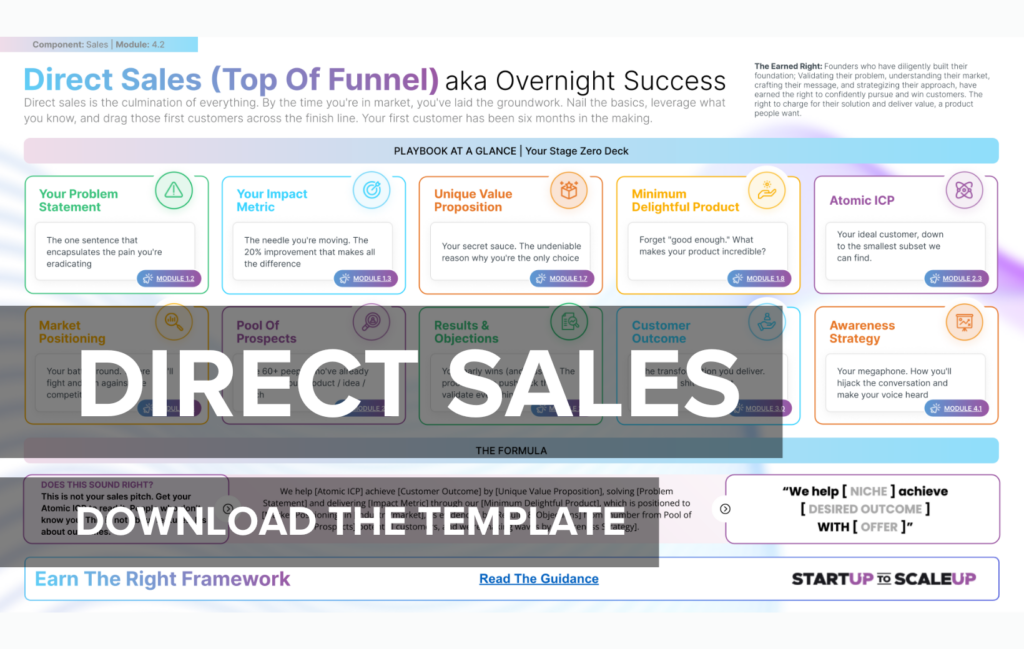How Can Startup Founders Master Direct Sales?
Why is founder-led direct sales crucial for early-stage startups?
Founder-led direct sales is critical for early-stage startups because:
- Authentic passion: Founders can convey genuine enthusiasm for their product.
- Deep product knowledge: Founders understand every aspect of their offering.
- Customer insights: Direct interactions provide valuable feedback for product development.
- Flexibility: Founders can make quick decisions to close deals.
- Credibility: Customers often prefer dealing directly with decision-makers.
- Resource efficiency: It’s cost-effective compared to hiring a sales team early on.
- Market validation: Successful sales prove there’s demand for the product.
In the early stages, founders are often the best equipped to sell their vision and product.
How can startup founders effectively pitch their products to early customers?
To pitch effectively to early customers:
- Know your audience: Research each prospect thoroughly before pitching.
- Focus on value: Emphasize how your product solves their specific problems.
- Use storytelling: Share the vision and mission behind your startup.
- Demonstrate expertise: Show deep understanding of the industry and problem you’re solving.
- Be transparent: Be honest about your startup’s stage and future plans.
- Offer social proof: Share any early successes or testimonials you have.
- Listen actively: Pay attention to the customer’s needs and tailor your pitch accordingly.
Remember, it’s about building a relationship, not just making a sale.
What strategies help founders build trust with potential clients?
To build trust with potential clients:
- Be authentic: Show your genuine passion for solving their problems.
- Provide value upfront: Offer insights or resources before asking for anything in return.
- Be transparent: Be open about your startup’s capabilities and limitations.
- Follow through: Always deliver on your promises, no matter how small.
- Show expertise: Demonstrate deep knowledge of your industry and product.
- Offer references: Provide contacts of satisfied customers or partners.
- Be responsive: Reply promptly to inquiries and be available for follow-ups.
Building trust is crucial, especially when asking customers to take a chance on a new startup.
How can founders balance sales efforts with other startup responsibilities?
To balance sales with other responsibilities:
- Set clear priorities: Determine how much time to allocate to sales versus other tasks.
- Create a schedule: Block out specific times for sales activities.
- Automate where possible: Use tools to streamline parts of the sales process.
- Delegate non-sales tasks: Assign other responsibilities to team members where possible.
- Integrate sales into daily activities: Look for sales opportunities in all interactions.
- Focus on qualified leads: Spend time on prospects most likely to convert.
- Use a CRM: Implement a system to manage leads and follow-ups efficiently.
Remember, in the early stages, sales should be a top priority as it directly impacts the startup’s survival and growth.
What metrics should startup founders track for early-stage sales?
Key metrics for early-stage sales include:
- Conversion rate: Percentage of leads that become customers.
- Sales cycle length: Average time from first contact to closing a deal.
- Customer Acquisition Cost (CAC): Cost to acquire a new customer.
- Average deal size: Typical revenue per sale.
- Pipeline value: Total potential value of all active leads.
- Customer Lifetime Value (CLV): Predicted revenue from a customer over time.
- Churn rate: Percentage of customers who stop using your product.
Regularly analyze these metrics to identify areas for improvement and optimize your sales process.
How can founders create a compelling value proposition for their startup?
To create a compelling value proposition:
- Identify your target customer: Clearly define who your product is for.
- Understand their pain points: Identify the specific problems your product solves.
- Articulate your unique solution: Explain how your product addresses these problems.
- Quantify the benefits: Provide specific, measurable advantages of using your product.
- Differentiate from competitors: Highlight what sets you apart from alternatives.
- Keep it concise: Craft a clear, memorable statement of your value.
- Test and refine: Get feedback on your value proposition and iterate based on responses.
Your value proposition should quickly convey why a customer should choose your product over alternatives.
How can founders leverage their unique position to close deals?
Founders can leverage their position by:
- Offering direct access: Emphasize the customer’s ability to work directly with decision-makers.
- Providing custom solutions: Use your authority to offer tailored solutions or features.
- Sharing the vision: Paint a compelling picture of your startup’s future and how the customer fits in.
- Demonstrating commitment: Show your personal dedication to the customer’s success.
- Making quick decisions: Use your position to expedite decision-making processes.
- Offering early adopter benefits: Provide special perks or pricing for first customers.
- Building personal relationships: Connect on a founder-to-founder level with other entrepreneurs.
Capitalize on the unique advantages of being a founder to differentiate your startup and close deals.
Mastering direct sales is a critical skill for startup founders, especially in the early stages. It’s not just about closing deals, but about building relationships, gaining market insights, and validating your product.
Start by crafting a compelling value proposition that clearly articulates how your product solves real problems for your target customers. Focus on building trust through transparency, expertise, and consistent follow-through. Leverage your unique position as a founder to offer value that salespeople can’t, such as direct access and custom solutions. Remember to track key metrics to continuously improve your sales process.
While challenging, founder-led sales can be a powerful driver of early-stage growth, providing the traction and market validation needed to scale your startup. Embrace this role, learn from every interaction, and use these insights to refine both your sales approach and your product.
